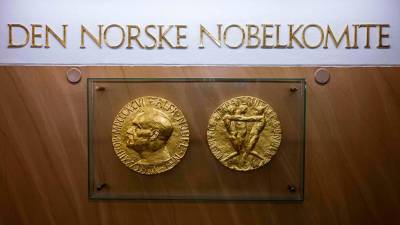STOCKHOLM: The Nobel literature prize to be announced on Thursday is likely to go to a Western male author this year, experts predict after South Korea’s Han Kang last year became the first Asian woman to win.
Awarding the prize to another woman this year would make history: it has never gone to a woman two years in a row, and women are vastly under-represented among its laureates — just 18 out of 121 since it was first awarded in 1901.
But literary critics in Stockholm told AFP they therefore expect a Western man to get the nod this year, citing Australia’s Gerald Murnane, Romania’s Mircea Cartarescu, Hungary’s Laszlo Krasznahorkai and Peter Nadas as possibilities, as well as Swiss postmodernist Christian Kracht.
Murnane and Krasznahorkai meanwhile have the lowest odds on betting sites, along with India’s Amitav Ghosh, whose name sailed up just two days before the announcement.
The 18-member Swedish Academy that awards the prize insists it does not take gender, nationality or language into consideration.
But “even if they say that they don’t think in terms of representation, you can still look at the list (of past laureates) and see that it’s kind of ‘OK, this year was a European, now we can look a little further afield. And now we go back to Europe. Last year was a woman, let’s choose a man this year’,“ Sveriges Radio culture critic Lina Kalmteg told AFP.
After a #MeToo scandal that rocked the Academy in 2018, every other laureate has been a woman, suggesting an effort to right past wrongs and improve the gender imbalance.
‘Bizarre masterpiece’
Bjorn Wiman, culture editor at Swedish paper of reference Dagens Nyheter, told AFP he thought this year’s winner would be a man “from the Anglo-Saxon, German or French-language world”.
Christian Kracht, a 58-year-old German-language postmodernist author who writes about pop culture and consumerism, is a favourite in literary circles, he said.
At this year’s Gothenburg Book Fair held annually a few weeks before the Nobel announcement, “many members of the Swedish Academy were there, sitting in the front row during his event”, Wiman said.
“And that is usually a sure sign,“ he said, adding that the same thing happened when Austrian playwright Elfriede Jelinek won the prize in 2004.
Another writer getting a lot of attention in the run-up this year is Australia’s Gerald Murnane.
Born in 1939 in Melbourne, his work draws heavily on his own life experiences.
His novel “The Plains” (1982) delves into Australian landowners’ culture, described by the New Yorker as a “bizarre masterpiece” that feels more like a dream than a book.
“The question is whether he’ll answer the phone (when the Academy calls), I don’t know if he even has one,“ joked Josefin de Gregorio, literary critic at Sweden’s other main daily Svenska Dagbladet.
“He’s never left Australia. He lives in the countryside, he doesn’t make himself very accessible,“ she said.
“I hope he wins, I want more people to discover his wonderful work,“ de Gregorio said.
Australian Aboriginal writer Alexis Wright has also been mentioned.
‘Unthinkable’
Other names that regularly make the rounds are Antiguan-American author Jamaica Kincaid, Canada’s Anne Carson, Chile’s Raul Zurita, and Argentina’s Cesar Aira.
The last South American to win was Peru’s Mario Vargas Llosa in 2010, and the region could be overdue, Kalmteg told AFP.
She also mentioned Mexican authors Cristina Rivera Garza and Fernanda Melchor.
With no public shortlist and the prize committee’s deliberations sealed for 50 years, it is always difficult to predict which way the Academy is leaning.
It has a penchant for shining a spotlight on writers relatively unknown to a wider public, with Wiman noting that it was previously known for being “openly elitist, artistically”.
“Authors like Han Kang would have been unthinkable five or six years ago,“ he said, noting that she was well-established internationally and only 53, while the Academy previously tended to honour older men.
The 2025 winner, who will take home a $1.2 million cheque, will be announced on Thursday at 1:00 pm (1100 GMT)- AFP
